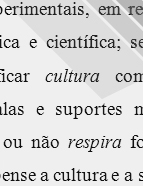

................................
2. The "thing". Having, at the very least, demarcated the terms of the problem, cultural consciousness is a relatively recent datum in that "recent invention" on a cosmic scale that is the human being (Foucault, Baudrillard). The movement of Erudition that preceded and followed the Aufklärung spread in small circles (more suited to the concentricity of the Enlightenment) and guides historical consciousness in the study of national literature. Understandably so. Particularism and providentialism, vital to traditional theogony and the cultural and political imagination that reflects the different levels of social aggregation thus partitioning the structure, would be refuted by the universalism of the Enlightenment, or rather, by its anthropocritical culture. To read those concepts, it is said that the idea of "nation" (a different idea from patria) demarcates unequally the diverse consciousness of social aggregation levels, given the hegemony of social syntaxes, not of political or religious syntaxes, which highlight the multiplicity and relative autonomy of various forms and horizontal and vertical formulations of social interdependence, to the detriment of the embryonic notion of "national" solidarity. Only in the 19th century, or the late 18th century, in Europe, was the struggle for cultural autonomy enhanced, no longer for the old enfranchisement of intermediate bodies. The Francocentric Voltairean civilisation and the German Kulturkampf, "fight for civilisation," in the Romantic and Idealist preludes would challenge the very idea of material civilisation (Elias, Teoria Simbólica [Symbolic Theory], 1994), mediating representations of the particular and the universal, the concrete and abstract, the empirical-sensible and intelligible, a matrix that the affirmation of European nation-states would convey in various forms, but more by accentuating national cultures and particularities.
3. Limits. Another problem is cataloguing the content, limits, and historical formulations of an identity and national culture, in this case, the Portuguese. There are, of course, empirical mediations prior to the modern formation of the nation-state, in the unifying medieval prerogative of writing and its teaching in the Dionysian General Studies, which emphasises exclusive, regional, and estate-based identities. In the chronicles of the 15th century, the increasing subjective status of the narrator does not lose the unequivocal sense of the significant —> significance circulation, only the humanism of the 16th century changes the function of the sign (A. J. Saraiva, O que é a Cultura?, 1994, p. 148; on Foucault, The Order of Things, 1975), opening culture to the diverse expression of unity.
